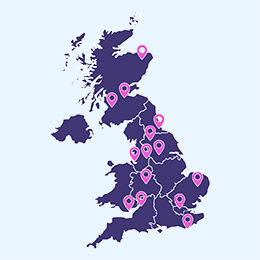- Licenced Business Rescue Experts
- Helping Directors in Debt
- Same Day Advice
For free expert advice, send us a message and we’ll be in touch
NOTE: The insolvency Experts can offer specialist advice to company directors dealing with Bailiffs or a CCJ in regard to business debt. If you are an individual who is seeking advice on matters related to bailiffs, we would recommend seeking guidance from the Citizens Advice Bureau.
What is a CCJ (County Court Judgement)?
A County Court Judgement (CCJ) is a court order that might be filed against you as a Director if you fail to repay money that you owe to your creditors.
A CCJ is usually instigated by a creditor of your company who has been unsuccessful in their attempts to recover a debt due.
If your company does receive a CCJ, its credit rating is likely to be impacted. Providing the CCJ is against the company, your personal credit rating should remain unaffected unless you have provided the benefit of a personal guarantee in respect of the debt.
How long does a County Court Judgement last?
If you receive a CCJ, it will stay on the Register of Judgements, Orders and Fines for six years.
If you pay off the full amount within one month, you can get the judgement removed from the register. You can write to the court to say that you’ve paid, but you’ll need to send proof of payment from the person or business you owed money too.
If you pay after one month, you can get the record of judgement marked as satisfied on the register. Again, you’ll need to write to the court that you’ve paid as well as proof of payment from the owed person or business.
How do I know if your company has a CCJ?
A CCJ will usually be delivered through the post, with the letter outlining:
- The fact that you have a CCJ against your business;
- How to respond to the CCJ;
- What action the court can take against you if you fail to respond to the CCJ.
If you think you have a CCJ against you but you don’t know for sure, you can find out through the public Register of Judgements, Orders and Fines.
The register will tell you the date of the judgement against you, the amount of money you owe and the name of the court who issued the judgement against you.
The register doesn’t list the name of the creditor who has taken out the CCJ against you, so you will have to follow up with the court listed and request details of the creditor involved so you can determine what the CCJ is for.
How does a CCJ affect a company?
If you pay or satisfy the CCJ within 30 days of the judgement being issued, the CCJ will not appear on your company’s credit file.
However, if you fail or are unable to pay the amount within the specified time, the CCJ will remain on your company’s credit file for six years. During that time period, your company credit score will suffer. This can make it more difficult to apply for business loans or other financial arrangements.
Lenders may be reluctant to deal with businesses that have a poor credit rating as it can reflect badly on your ability to repay what you’ve borrowed.
Can a CCJ force my company to pay its debts?
No, a CCJ cannot force a company to repay its debts. However, it may reflect the start of a downward spiral which can result in the winding-up of a company.
What effect does a CCJ have on company directors?
A CCJ will affect your company’s credit rating; however, unless the company director has some sort of guarantee connected to the business, their credit file should remain unaffected.
However, if you, as a director, conduct your company banking with the same bank account as you do with your personal banking, a CCJ will affect your personal credit file and therefore affect your personal borrowing capacity, such as mortgages, overdrafts and credit cards.
Your bank may also view your income as unreliable which could cause problems for you personally.
Will a CCJ make Directors’ personally liable for their Company debts?
A CCJ alone cannot make a director personally responsible for the company’s debts, but it does provide clear evidence that the company is unable to pay its debts and is therefore insolvent.
If the director acts in their own or their company’s best interest, rather than in the interest of the creditors, then they can be held personally liable for the company’s debts.
Call our friendly experts on 03003 038284
By quickly taking back control, we can help you solve the problems that your business has.
What is the CCJ process?
Firstly, a County Court Summons will be issued to your company in an attempt to recover the debt. You will be given 14 days to respond, although you can request a further 14 days extension.
If you are unable to negotiate or do not respond, and the Court deems the debt valid, a CCJ will be issued against your company.
Once the CCJ is awarded, you will be given 30 days in which to pay the debt in full, or the Court will register the CCJ, which will significantly impact your company’s credit rating.
If the debt remains unpaid during this period, this is seen as evidence of your company’s insolvent position.
This may result in the creditor taking further action in the form of a winding-up petition which could quickly result in Compulsory Liquidation and the closure of your company.
If your company is threatened with a CCJ, the Court paperwork should be completed and returned as soon as possible. If negotiations with the creditor are unlikely to be successful during the 14 day response period, it is imperative that you seek professional advice.
There are a range of formal insolvency solutions that may save your company in the event of a CCJ being awarded. At The Insolvency Experts, we are happy to arrange a free consultation either at your local office, or a location convenient to you.
If your company is issued with CCJ proceedings, be mindful of the following:
- Respond within 14 days (or request a further 14 day extension)
- Check the amount is correct
- Dispute the debt if you have a valid reason to do so
- Attempt to negotiate in writing or by telephone to pay by instalments, although if the matter has reached this stage, successful negotiations are uncommon
- Hire a Licensed Insolvency Practitioner to negotiate on your behalf, and also to provide you with a number of alternative solutions, depending on your company’s circumstances
- Remember, having an unsatisfied CCJ registered against your company will significantly impact its ability to trade. Upon registration, the CCJ will sit on your company’s credit file and will be visible to any suppliers that may otherwise offer credit terms.
How do creditors obtain a CCJ against your company?
A creditor will only file for a CCJ if they have repeatedly tried to get you to repay without any success.
- Firstly, the creditor must complete an online application form, which will ask for details about the circumstances of the claim.
- Once that has been submitted, you will receive a letter from the court outlining the details of the claim as well as asking you to complete a form to give your side of the story.
- The county court will then decide whether there is a proven debt to pay. If the court sides with the creditor, you will have 4 days to agree to make the payment, dispute the claim or ask for a 14 day extension.
- If you fail to respond, the CCJ will be registered in a default against you. If you don’t dispute the CCJ, you will have 30 days from the judgement to pay in full or to arrange a payment plan with the creditor.
When can a creditor issue a county court claim?
If you have not settled a debt with someone, you may be issued with a County Court Claim. They shouldn’t come unexpectedly, as the creditor must send you a warning letter first, informing you that you must settle your debt with them, otherwise they will proceed with legal action.
Your creditor should have either sent you a ‘default notice’ or a ‘letter before action’ (which one of these depends on the nature of the debt). The letter should inform you of how you can settle the debt, and their intended proceedings if the debt isn’t settled.
If you receive one of these letters, you should act upon it immediately – if you’re unaware of your options, you need to seek the advice of a qualified Insolvency Practitioner.
What should I do after being issued with a CCJ?
Should you be issued with a CCJ, and do not stick to the terms set out within it, the creditor can request that the court enforce the debt. This can be by way of:
- Bailiff action
- A charging order
- An attachment of earnings
Under a CCJ process, a creditor can request the court of a bailiff to collect the debt. A bailiff can only collect debts when the courts permit and issue a Warrant of Execution. Only once this has been issued does a bailiff have the power to visit your business (or home depending on the debt) to collect the money you owe.
Should a bailiff visit your home or business, you should call us immediately to understand your rights and seek efficient advice. Alternatively, the creditor can request that a charge be secured against an asset (usually property), whether the asset is owned outright or has outstanding finance (such as a mortgage or debenture).
The final option is an Attachment of Earnings Order, whereby the money is deducted directly from your wages by your employer.
Call our friendly experts on 03003 038284
By quickly taking back control, we can help you solve the problems that your business has.
Is it possible to stop the court from issuing a CCJ against a company?
As long as you have a good reason to challenge a CCJ, it is possible to stop the court from issuing one against you.
If you don’t agree with the amount owed to the creditor, or if you can dispute the existence of debt at all, you can contest the judgement. This is done by submitting a N244 form, as well as any supporting documents. This must be done within the prescribed timeframe of the CCJ being filed by the creditor.
If you apply to have the judgement set aside, this will most likely involve a court hearing that you must attend. If you fail to attend, your challenge will be thrown out and you will be ordered to pay the amount for the judgement.
If you feel a CCJ against your company is unjust, or want to discuss your options in regards to challenging a CCJ, our expert team of advisors can help you through the process and find your best options.
What happens if I don’t pay a CCJ?
If you refuse to, or don’t pay, a CCJ within 30 days, it stays on your company’s credit file for six years.
The creditor will have a range of enforcement options available to them, which will typically start with bailiffs turning up to recover the debt or to seize goods to sell to auction.
If the debt remains unpaid, the creditor could issue a winding up petition against your business. This will give you 7 days to repay the debt. The winding up petition will be heard by the court and, if the court rules against you, a winding up order could be made and the company will be closed down by compulsory liquidation.
If this is the case, we are here to help you. We can provide specialist help with winding up petitions, as well offer free liquidation quotes if this is the best option for your business.
How to avoid receiving a CCJ
The best way to avoid a CCJ is by contacting the creditor. You will want to explain your situation to them before they start court action. The more you communicate with the creditor, the less likely you are to end up with a CCJ.
Some creditors can put arrangements in place so you are able to repay them, and in some cases, they may even suspend your payments for a while, giving you some breathing space to organise a repayment plan for the future.
Alternatively, creditors may lower the payments or freeze the interest on them so you aren’t penalised for any missed payments.
Another option is a debt solution plan, which can help you to get unmanageable debts under control before the threat of a CCJ. One example is a Company Voluntary Agreement (CVA), which is a legally binding agreement, meaning as long as you stick to the terms of the Proposal, a creditor cannot take legal action against the company.
If you successfully pay the agreed CVA contributions, it will write off any balance due.
What is the best way to deal with a county court claim?
As with most debt matters, it’s imperative to seek professional advice straight away before the CCJ process advances. The earlier you deal with these matters, the more options that are available to you, including looking into how to stop a county court judgement or even achieve a county court judgement removal.
One main way to have a CCJ suspended is through a Stay of Execution. Check out our detailed blog post on ‘What is a Stay of Execution?’ to learn how these work and how you could use them to stop a County Court Judgement.
You should always respond to a claim of this type, as it allows you to put your circumstances forward to the Court, often influencing the terms of the settlement. If you do not respond, and simply ignore the letter or notice, the court can still issue the judgement against you or your company. If they have not been made aware of your circumstances, they may simply order for the debt to be settled in one go, rather than spreading out the payments.
Responding to a Claim Form
Once you receive your Claim Form, you have 14 days in which to issue a response. With the form, there is usually an Income and Expenditure form, which allows you to detail your money in and money out. Completing this form helps the courts to decide on the payment amounts and how frequently they will be making payments towards paying off the debt.
In responding to a Claim Form, you have the option to admit to the claim, agreeing that you owe the amount stated. You may also file a defence, if you do not agree with the amount owed – should you choose to go down this route, it’s essential that you seek advice from a professional in order to assist with the negotiations.
There is also an option to submit an acknowledgement of service, which informs the court you will defend the claim, but require longer than the 14-day period. Should the order be granted, and you still receive the judgement, the Court has power to enforce payment, either by instalments, or “forthwith”, whereby the total is due immediately.
Call our friendly experts on 03003 038284
By quickly taking back control, we can help you solve the problems that your business has.
FAQs about County Court Judgements
How long does a CCJ stay on your credit file?
A CCJ will stay on your credit file for 6 years from the date of the judgement.
However, if you pay the full amount within a month, it is possible to apply to have the CCJ removed from your credit file as well as public records.
Where do I get the right advice on a county court judgement process?
If you receive a County Court Order or any of the enforcement letters in the CCJ process, it is very important to get professional advice at the earliest stage possible. In our experience, the after-effects of a CCJ can significantly damage a business and its trading activities, so it is always useful to look into how to stop a county court judgement, or county court judgement removal, or even how to best go about arranging payment terms.
A qualified Insolvency Practitioner will be able to give you the best advice for your specific business circumstances.
For more information on the CCJ process, please contact our expert team at The Insolvency Experts by email on enquiries@theinsolvencyexperts.co.uk or call our team of specialists directly for more information on 0300 303 8284.
How to get a CCJ cancelled/ ‘set aside’
If you have fully paid a CCJ within a month of the judgement date, you can apply to have it cancelled or set aside by providing the court with proof of payment to the creditors.
The judgement should then be removed from the Register once the court has accepted the proof of payment.
How to get a CCJ marked as ‘satisfied’
If you pay a CCJ in full after a month, it will be marked as satisfied in the Register.
You will need to write to the court to say you’ve paid, as well as showing proof of payment to the creditor.
Your CCJ will stay on the Register for six years, but people will be able to see that you have paid in full.
Is there a CCJ register?
Yes, the CCJ register is known as The Register of Judgements, Orders and Fines. It is a public register, containing the details of companies and people who have a CCJ issued against them.








